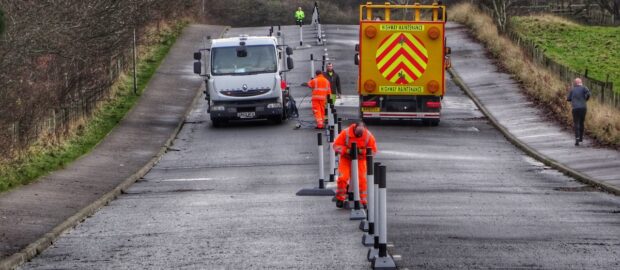Edinburgh City Council watchdogs have warned the local authority that ‘significant improvement is required’ over its controversial Spaces for People scheme.
The council’s internal auditors have concluded that both the council’s finances and reputation have been put at risk by the traffic schemes, which were first implemented in response to the need for social distancing during the coronavirus pandemic.
The damning report gives the council a ‘red’ rating – the second worst possible – which means ‘significant and/or numerous control weaknesses were identified, in the design and/or effectiveness of the control environment and/or governance and risk management frameworks’.
The report concludes that:
- Initial SfP initiatives considered for prioritisation were based on suggestions from a relatively small group of officers and external local community stakeholders
- The majority of initiatives were initially prioritised by six project team members in April 2020
- Where public feedback was incorporated into projects, no audit trail was available to confirm that this was completed
- There is currently no clear strategy for determining the potential exit costs associated with reversing individual projects, or transitioning them into permanent solutions, and it is currently unclear how any significant exit costs will be funded.
- The council’s reputation took a hit due to a public perception that feedback provided through the Commonplace survey was not considered in relation to ongoing schemes
The report will be discussed at a meeting of the council’s governance, risk and best value committee, which is due to meet on Tuesday August 10.
The history of the Spaces for People in Edinburgh has been mired in controversy, with various pressure groups and community organisations both criticising and lauding the traffic schemes.
In May 2020 the Scottish government announced funding for the Spaces for People programmes, which aimed to provide safe options for essential journeys during the coronavirus pandemic.
Since April of that year, the council has used the £5m it received from the Scottish government to introduce various road closures and temporary traffic measures using emergency coronavirus powers.
At the time, the council used Temporary Traffic Regulations Orders (TTROs), which allowed them to install temporary bike lanes, wider pavements and road closures for a maximum of 18 months.
The council says residents living near these schemes were able to provide feedback which was then used to alter and improve the schemes, but anti-Spaces for People campaigners and resident’s organisations have complained about the perceived lack of consultation and improvements to the schemes.
But in June, as the council approached the end of the 18-month TTRO period, city planners began extending the Spaces for People schemes for another 18-month period using Experimental Traffic Regulation Orders (ETROs).
This means some ‘temporary’ traffic schemes will have been in place for three years before either being made permanent or scrapped entirely.











